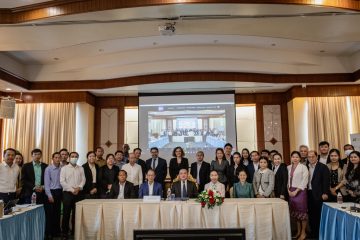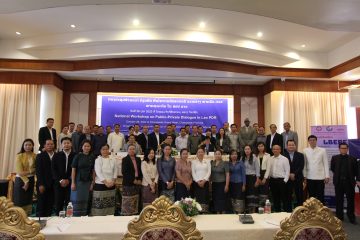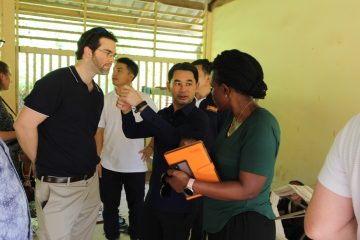The Department of Planning and Cooperation Stakeholder Consultation Workshop for the Study on the Identification of Key Constraints Affecting Women-owned and Managed Enterprises in Doing Business in Lao PDR
Vientiane Capital, 22 March 2021, Crown Plaza Hotel. The Department of Planning and Cooperation (DPC), Ministry of Industry and Commerce (MOIC), conducted a Stakeholder Consultation Workshop on the Gender Study on the Identification of Key Constraints Affecting Women-owned and Managed Enterprises in Doing Business in Lao PDR. The workshop was co-chaired by Mr Sengphanomchone Inthasane, the Deputy Director-General of the DPC, and Ms. Sommay Phommounivong, the Deputy Director-General of the Department of Organization and Personnel. More than 70 participants attended the meeting, 55 of them female, including representatives of public sectors, donors, development partners, department, the Lao National Chamber of Commerce and Industry and private sector associations.
The workshop enabled participants to provide comments and feedback for Ms. Lauren Clark, the International Consultant conducting the study. This study will be the reference for project implementation, especially on gender mainstreaming in trade.
In his opening remarks, Mr. Sengphanomchone Inthasane stated: “to ensure LCT project implementation’s effectiveness, the project considers gender mainstreaming in the trade as an essential part of project implementation. Therefore, the DPC assigned an international consultant to conduct the study to support gender mainstreaming in trade. The study uses male and female economic participation as its primary indicator and the reference for learning about gender equality in trade sectors. The recommendations from the study will form the reference for the project action plan and for policy reform on gender equality in trade”.
Ms. Sommay Phommounivong added that: “according to the executive summary of the study, while remarkable progress has been made on economic achievements in Lao PDR, gender gaps remain for several indicators, particularly education, literacy rates and business participation. The contributing factors are complex and likely due to social perspectives rather than legal constraints”.
The successful meeting produced these key outputs:
- The study contrasted the amount of time available to male and female entrepreneurs for developing their skills and businesses, because the women have more domestic responsibility than their male counterparts.
- Most participants agreed with the study results, especially the wide gender gaps occurring outside the city. Meanwhile, participants working in the private sectors agreed that there was not much difference between women and men entrepreneurs, and that most opportunities and challenges facing women entrepreneurs are similar to those facing their male counterparts.
- The donors and development partners suggested that the study’s executive summary should add some background, the rationale of the study, and how the study was conducted.
- The participants also suggested that the study recommendations should be more specific, especially in relation to how to address the issues mentioned in the study.
Before the workshop ended, Mr. Sengphanomchone Inthasane expressed his gratitude to Ms. Lauren Clark for her efforts in conducting the study and gathering feedback from all participants to improve it, and thanked all participants for giving their time to attend. Mr. Sengphanomchone also informed the participants that all comments and feedback from the workshop, and the feedback and comments received by email, will contribute to finalizing the study, which will take around two weeks. After the study is finalized, it will be validated, translated and disseminated for use as a reference for gender-related project implementation under LCT as well as other project implementation.
This workshop is supported by the Lao Competitiveness and Trade (LCT) project. The LCT project is a multi-donor project funded by the World Bank Group, Australian Aid, Irish Aid, and USAID to eliminate the barriers to private sector-led growth by improving the regulatory environment, lowering trade costs and raising firm-level competitiveness.


